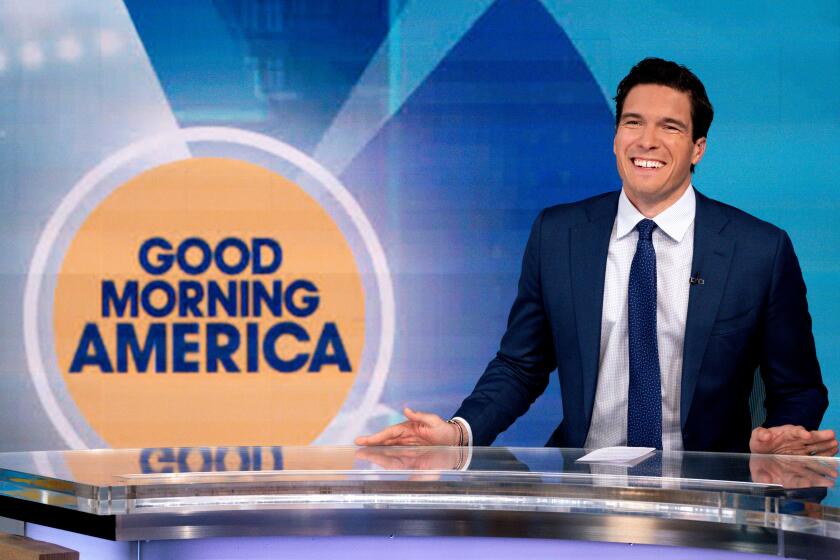Westwood One to Buy Mutual Broadcasting From Amway Corp.
Westwood One, a rapidly expanding Culver City-based radio production and distribution company, said Monday that it will buy Mutual Broadcasting System, the nation’s largest radio network.
Price and terms of payment were withheld pending the November finalization of the sale, but industry sources put the price tag at less than $20 million. The venerable Mutual network has consistently lost money for Amway Corp., which bought it in 1977 for about $15 million.
More than a year ago, Amway had been rumored to have put the network on the block, and Westwood One’s name surfaced several times in industry newsletters as an obvious potential buyer. Amway, which is privately owned and better known for its direct marketing of soap and other products, declined to say why it is selling the radio network.
In more ways than one, the merger is viewed by media stock watchers as a near-perfect melding of old and new.
While Westwood One is a 9-year-old, publicly traded Culver City company best known for its rock-concert and youth-oriented radio broadcasts, Mutual is a 51-year-old network that is best known for its award-winning radio news operation and its distribution of the nation’s most popular radio talk show, “The Larry King Show.”
“We’re basically in the entertainment business,” Westwood One President Norman Pattiz said. “We’ve never had a news operation.”
For several years, Westwood One’s identification with pop programming and live rock-concert syndication has precluded it from appealing to advertisers seeking an older audience.
“Madison Avenue never thought of us for older, adult advertising buys,” Pattiz said. “But they never thought of Mutual in terms of (younger audience) programming either. We think what we’ve now got is two plus two equals five.”
The Westwood One/Mutual merger will be the third takeover of a major radio network operation by a smaller media company this year.
Last winter, RKO sold both of its radio networks to United Stations--a New York-based radio syndication company that is controlled by TV personality Dick Clark.
And, in June, shareholders of Capital Cities Communications and American Broadcasting Cos. agreed to a merger that will effectively place all seven of ABC’s radio networks under Capital Cities’ control.
(Unlike Mutual, which offers a single network service to its affiliates, both RKO and ABC had begun “narrow-casting” to targeted audiences in recent years. ABC’s Talk Radio network, for example, broadcast only to affiliates with an all-talk format, and its Rock Network delivered programming specifically for affiliates with rock-music formats.)
Westwood One’s shares have been traded over the counter for 16 months, climbing from an opening price of $14.50 a share in March, 1984, to its current price of $31 a share, reported at closing Friday.
Based on Westwood One’s public filings and best guesses of Mutual’s 1985 billings, industry sources estimate that the combined revenues of the two companies will be between $45 million and $50 million by the end of the year.
Westwood One has carried 24,000 30-second ads to Mutual’s 40,000 thus far this year.
Keep Transponder Channel
Under terms of the purchase agreement, Ada, Mich.-based Amway will retain its lease of a transponder channel on the Westar IV communications satellite over which all Mutual programs are broadcast. For the immediate future, Mutual programs will continue to be broadcast over Amway’s Westar satellite channel, even though Westwood One leases its own transponder on RCA’s Satcom 1-R communications satellite.
Amway is turning over everything else associated with the venerable news network to Westwood One, including:
- Affiliation agreements with about 860 radio stations calling for delivery of a full range of Mutual services and advertising. (In Los Angeles, for example, KMPC is Mutual’s primary affiliate. As a result, KMPC has the right of first refusal on most Mutual program offerings.)
- Programming service agreements calling for delivery of at least one of Mutual’s array of news or programming services to about 2,200 stations. (In Los Angeles, KOST-FM is not a Mutual affiliate but does carry its National Music Survey countdown program on a contract basis.)
- Mutual’s Arlington, Va., headquarters building and its Bryn Mawr, Pa., satellite up-link facility plus more than 700 corresponding satellite down-links to affiliates across the country.
- Equipment, vendor and production contracts and a staff of about 200.
Pattiz said he plans no radical changes to the Mutual Radio News operation, headed by former NBC newsman and presidential press secretary Ron Nessen and once the home of such radio news pioneers as the late Gabriel Heater.
Mutual’s other chief strength--Washington’s pre-dawn talk show host Larry King--will also remain with the network.
Mutual was created in 1934 when four radio stations in New York, Detroit, Cincinnati and Chicago joined forces to distribute and produce such memorable programs as “The Lone Ranger,” “The Shadow” and “Lum and Abner.” Twenty years later, it was the only major broadcast network that did not opt to join the television revolution of the 1950s.
Despite its flagging revenues during the past two decades, Mutual has retained its place as the largest single radio network in terms of total number of stations served, and it continues to deliver its top-of-the-hour newscasts to more listeners than any other single network.
Motown Sound
Pattiz created Westwood One in 1976 as a production facility that specialized in radio programs featuring the Motown sound.
The company’s program offerings have since expanded to 28 regular national programs, including the weekly “Dr. Demento” program and “Off the Record With Mary Turner.”
In addition to its Culver City headquarters, Westwood One also has offices in New York and London.
“I think the merger is not a great surprise,” said Jim Duncan, a Michigan data analyst who publishes a semiannual study of national radio trends.
“The rumors have been flying for two or three years that Mutual was for sale. Amway was losing money on it because they’re not radio people. I don’t think Amway had much idea of how to operate in the radio business at all.
“And Westwood One is intimately involved with radio. Lord knows they’ve got all that programming stacked up, so it’s a pretty good marriage for them. Now they’ll have all those affiliates for their programs.”
More to Read
The biggest entertainment stories
Get our big stories about Hollywood, film, television, music, arts, culture and more right in your inbox as soon as they publish.
You may occasionally receive promotional content from the Los Angeles Times.






